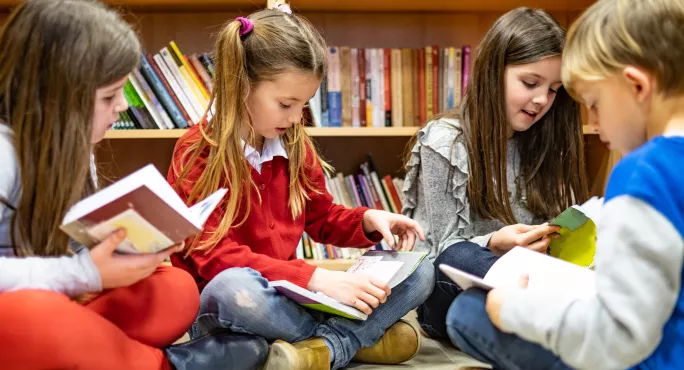More catch-up cash ‘needed for 3-month reading gap’

Pupils were still three months behind in reading by the end of the past academic year due to the impact of the pandemic and school closures, according to research published today by the Education Endowment Foundation (EEF).
The EEF report reveals that little progress had been made in Year 1 reading attainment between the spring and summer terms of 2021 - it remained at three months below pre-Covid levels.
However, the data reveals that efforts to support education recovery in maths have so far been more successful, with Year 1 only one month behind in summer term 2021, and above expected standards in Year 2.
- Covid: Scale of regional learning loss revealed
- Catch-up: How the second lockdown widened learning loss
- Background: Primary teachers face three months of Covid learning loss
In Year 2, the Covid gap in reading was three months in spring 2021, with a small catch-up by summer 2021 to a still significant two-month attainment gap.
Covid catch-up: Disadvantaged pupils ‘worst hit by school closures’
In addition, the report reveals that disadvantaged pupils had been “the worst affected by school closures” and says that support should be targeted at this group.
In both Year 1 and 2, disadvantaged pupils had a seven-month attainment gap when compared with their peers. Pre-pandemic, this gap was around six months, proving that school closures have widened this gap.
In September 2021, a survey of more than 650 frontline workers showed that two-thirds of disadvantaged pupils had fallen behind in their education.
Earlier this year, EEF chairman Sir Peter Lampl warned that a lack of funding to mitigate the long-term impact of school closures could be a catastrophe” for disadvantaged children.
Professor Becky Francis, CEO of the EEF, said: “Whilst these findings are encouraging, it is clear that continued efforts are needed to support recovery.
“Important work is already being done in schools to ensure that children’s progress is brought back on track and their wellbeing is restored in the wake of the pandemic. There are signs that this is already paying off, particularly in maths.
“However, schools need ongoing access to resources and capacity which will allow them to perform at their best, and to ensure that pupils surpass “recovery” and achieve the full extent of their potential.”
Dr Ben Styles, head of classroom practice and workforce at the National Foundation for Educational Research (NFER), said the report reveals the “challenges faced by pupils”, in particular disadvantaged pupils, over the past 20 months.
“Significant and sustained investment will be required to enable children to fully recover - both in academic terms and in terms of their wellbeing and mental health, and we will continue to monitor the government’s commitment to deliver on its recovery pledge,” he added.
The report authors used data from reading and maths assessments taken by more than 10,000 key stage 1 pupils (five- to seven-year-olds) from 168 representative schools in the autumn term of 2020 and the spring and summer terms of 2021.
In order to estimate the Covid gap in learning, these pupils’ attainment was compared with a sample representative of Year 1 and Year 2 pupils before the pandemic.
Schools ‘still suffering from huge disruption’
Paul Whiteman, general secretary of school leaders’ union the NAHT, said: “The good news is that it shows strong progress made by educators once children returned to schools in the 2021 summer term.
“Educators know what they are doing, and it is important that schools are allowed to focus on the strategies and programmes they know work best for the children in their schools.
“But schools are still suffering from huge disruption, with high levels of Covid-related absence for both pupils and staff. This needs to be recognised and more needs to be done to help bring the situation under control to allow schools to concentrate on the excellent recovery work they are doing.”
Geoff Barton, general secretary of the Association of School and College Leaders, said: “It comes as little surprise to learn that the very youngest children in our schools have struggled to make progress as a result of the pandemic, nor that the most disadvantaged youngsters have slipped further behind their peers during a period of unprecedented disruption to education.
“Although the EEF’s research shows improvements have since been made in maths for pupils in Years 1 and 2 during the spring and summer terms this year, it is clear that significant effort will be needed to foster the same strides forward in reading development.”
Mr Barton warned that it was “vital” that schools’ work “is not shackled by insufficient funding from the government”.
Mr Whiteman added that the “additional pressures” of statutory tests this year would be a “distraction” from recovery.
Earlier this year, school leaders warned it would be “ridiculous” to hold Sats in 2022, claiming their use to compare schools would be “desperately unfair.”
You need a Tes subscription to read this article
Subscribe now to read this article and get other subscriber-only content:
- Unlimited access to all Tes magazine content
- Exclusive subscriber-only stories
- Award-winning email newsletters
Already a subscriber? Log in
You need a subscription to read this article
Subscribe now to read this article and get other subscriber-only content, including:
- Unlimited access to all Tes magazine content
- Exclusive subscriber-only stories
- Award-winning email newsletters
topics in this article



